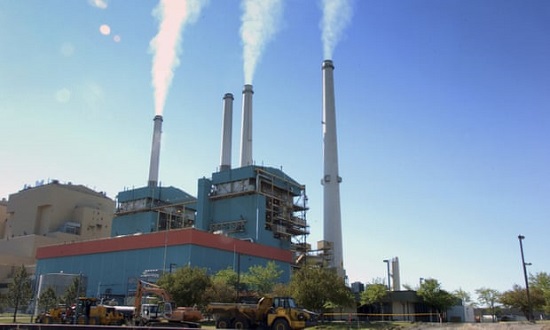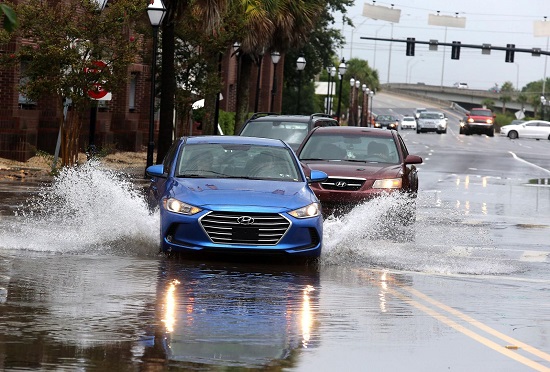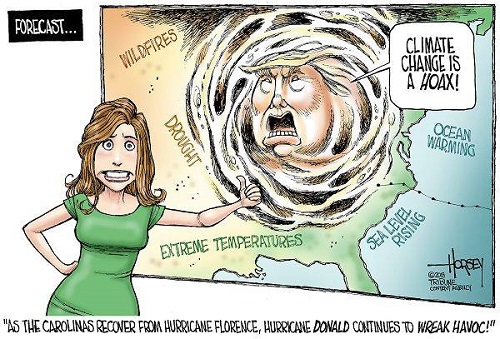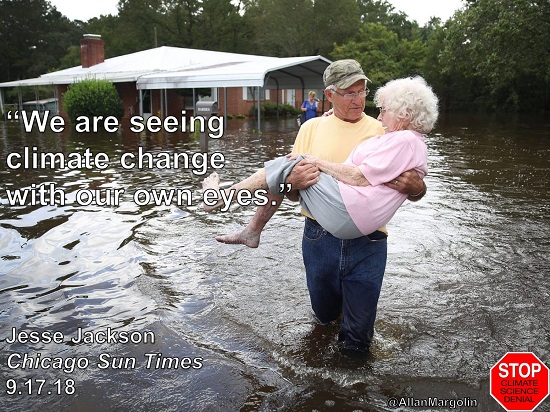2018 SkS Weekly Climate Change & Global Warming Digest #39
Posted on 30 September 2018 by John Hartz
Calls to Action... Story of the Week... Opinion of the Week... Toon of the Week... SkS Spotlights... Video of the Week... Report of Note... Coming Soon on SkS... Poster of the Week... SkS Week in Review...
Story of the Week...
World 'nowhere near on track' to avoid warming beyond 1.5C target
Exclusive: Author of key UN climate report says limiting temperature rise would require enormous, immediate transformation in human activity

Avoiding a temperature increase of more than 1.5C will be ‘extraordinarily challenging’, says the report’s author. Photograph: Matt Brown/AP
The world’s governments are “nowhere near on track” to meet their commitment to avoid global warming of more than 1.5C above the pre-industrial period, according to an author of a key UN report that will outline the dangers of breaching this limit.
A massive, immediate transformation in the way the world’s population generates energy, uses transportation and grows food will be required to limit the global temperature rise to 1.5C and the forthcoming analysis is set to lay bare how remote this possibility is.
“It’s extraordinarily challenging to get to the 1.5C target and we are nowhere near on track to doing that,” said Drew Shindell, a Duke University climate scientist and a co-author of the Intergovernmental Panel on Climate Change report, which will be unveiled in South Korea next month.
“While it’s technically possible, it’s extremely improbable, absent a real sea change in the way we evaluate risk. We are nowhere near that.”
World 'nowhere near on track' to avoid warming beyond 1.5C target by Oliver Milman, Guardian, Sep 27, 2018
Opinion of the Week...
Editorial: Politicians will make flooding a priority when voters do.

Thunderstorms in August caused some localized flooding at some downtown Charleston intersections like Cannon and President Street. Brad Nettles/Staff
Want to do something about flooding? Vote.
Luck is one of the most underrated things in life, and we got lucky when Hurricane Florence spared us. We could just as easily have been Wilmington. There is no question that the city is showing admirable new urgency in dealing with our flooding crisis. You could see it in the preparations and you can see it in the improved regular maintenance in the streets. Three disastrous floods in three years can focus the mind and elected officials. But at base, nothing has changed. The next time it could be us, and in time it will be us.
Charleston faces a massive $2 billion-plus job of saving itself. With an annual operating budget of just $180 million, half of that dedicated to cops and the fire department, there is no way the city can do it alone. Yelling at the mayor will only get you so far.
Editorial: Politicians will make flooding a priority when voters do. Opinion by Steve Bailey, Post & Courier (Charleston, SC), Sep 30, 2018
Toon of the Week...

SkS Spotlights...

The Sustainability, Energy and Environment Community (SEEC) website answers the questions most frequently asked by those willing to act. What are the most important actions for us to take? What’s doable? What’s next? And how can we find out without reading through multiple lengthy sources?
Simple or in-depth
Act on Climate uses a layered approach that condenses actions into simple priorities. Stop there, or explore actions that interest you the most. Want to dig even deeper? Our actions link to recent research and detailed resources on the topic. Developed with the help of social scientists, the website focuses its message in a way that is easy to relate to.
Relevant
The website was developed with the help of climate scientists. The discussion of actions is factual and dependable, with links to recent supporting research. Short, plain-language summaries of the science and expected effects of climate change link to more in-depth reading. “My story” sections give examples of how our scientists practice what we preach.
Unique
The website includes important actions to advance justice and resilience, topics often left out of online climate resources.
Video of the Week...
Greta Thunberg at People's Climate March Sweden 2018
Greta Thunberg, 15, address Hjärtat Slår för Jorden (The Heart Beats for the Earth) People's Climate March Sweden September 8th, 2018. Greta's Strike for the Climate will continue every Friday outside the Parliament. Join - outside yours!
#climatechange#climatestrike#GretaThunberg#klimatstrejk
Greta Thunberg at People's Climate March Sweden 2018, YouTube Video posted by Jan Viklund, Sep 13, 2018
Report of Note...
"The Sierra Club’s “2018 Ready for 100 Case Study Report” outlines how 10 US cities have made ambitious commitments to be powered with 100% clean energy. These cities are embracing renewable energy options like wind and solar to show the progress and impact that cities can make to lead climate action globally and locally."
The US Is Ready For 100% Clean Energy — 10 Cities Model How To Get There by Carolyn Fortuna, Clean Technica, Sep 28, 2018
Coming Soon on SkS...
- New study finds incredibly high carbon pollution costs – especially for the US and India (Dana)
- How Arctic lakes accelerate permafrost carbon losses (Carbon Brief)
- SkS Analogy 14 - Inertia and Inevitability (Evan)
- Guest Post (John Abraham)
- New research this week (Ari)
- 2018 SkS Weekly Climate Change & Global Warming News Roundup #40 (John Hartz)
- 2018 SkS Weekly Climate Change & Global Warming Digest #40 (John Hartz)
Poster of the Week...

SkS Week in Review...
- 2018 SkS Weekly Climate Change & Global Warming News Roundup #39 by John Hartz
- New research, September 17-23, 2018 by Ari Jokimäki
- New research shows the world’s ice is doing something not seen before by John Abraham (Climate Consensus - the 97%, Environment, Guardian)
- Retraction of Florides et al. (2013) by Ari Jokimäki
- New study reconciles a dispute about how fast global warming will happen by Dana Nuccitelli (Climate Consensus - the 97%, Environment, Guardian)
- 2018 SkS Weekly Climate Change & Global Warming Digest #38 by John Hartz































 Arguments
Arguments






























This is developing to become a man-made disaster of epic proportions.
The economic over-development in the incorrect direction, economies substantially based on the benefits of the global burning of fossil fuels, is a bubble. It is undeniably unsustainable and undeniably more harmful the longer it is allowed to go uncorrected. Trying to increase the already incorrectly over-developed perceptions of superiority relative to others just makes the future consequences worse.
The future consequences of the lack of correction of unsustainable and harmful economic development are two things: more significant and more rapid required corrections of the incorrectly developed economic activities, and more costs of 'trying to clean up' the harmful results that grew to a larger magnitude due to the lack of earlier correction. The lack of previous action to correct the incorrect direction of development has already created some harms that may be impossible to clean up (to fully undo).
The current generation is facing a more significant economic bubble correction and more clean-up than it would have had to if previous generations of global leadership had more responsibly started correcting what had developed. And the situation is made worse by every year of continued successful resistance among the global 'undeserving winners of perceptions of wealth and superiority relative to others' to the undeniable required corrections of what has developed.
Some richer people deserve to become poorer, particularly the ones who have pursued more personal wealth from fossil fuel burning through the past 30 years. It is as simple as that. That has happened to some of the coal barons. It needs to happen to oil barons and natural gas barons.
The loss of undeserved perceptions of wealth happens all the time with economic corrections. But what can also be seen to happen is that many of the richer people do not become as poor as they deserve to be. Instead, already less fortunate people suffer more because the wealthier ones have power to protect their undeserved perceptions of superiority relative to others.
Big changes are coming. Hopefully global leadership can get the correct changes to happen. The less successful they are at making correct change, the worse things will become. And things have already become very bad.
Upon further consideration, I would change the last sentence in my comments opening para to be: "Trying to maintain or increase the already incorrectly over-developed perceptions of superiority relative to others just makes the future consequences worse."
Yes progress is agonizingly slow and its turning into an epic disaster. I wonder if part of the problem is people are just not scared enough yet. For example we mostly talk about warming of possibly 4 degrees by 2100 and I suggest its easy to be complacent about this, it doesn't sound so much. Of course it is huge in physical terms with dire consequences , but I'm talking about the general psychological perception the public might have.
Now the other day I was looking at a chart of IPCC emissions scenarios that happened to have a worst case scenario of 12 degrees by year 2300 approx. if we continue to burn fossil fuels in a worst case business as usual scenario and burning fossil fuels is something various politicians are quite happy to see happen. I do wish to be accurate that this dire scenario is at the outer bounds of error bars etc, but even 9 degrees would be absolutely dire.
These projections get a little buried in iPCC reports, and the media focus is on the year 2100, but the year 2300 is not that far into the future in terms of human history and our grandchildren or their children etcetera, and obviously 12 degrees would be horrendous, an existential threat of collosal scale. These projections need more publicity in the general media so the public are firmly aware of them. Its not sensible to be only focussing on 2100. It is of course important as its in some of our lifetimes and certainly our childrens, but it can create a false sense of security to think only about this century.
Now I know sacremongering can have the reverse effect that it intends, and care is needed in what the climate community says to the public. I don't think it helps when people like Guy McPherson proclaim that humanity could be extinct within decades (although he makes many good points) because its based on very thin evidence and insults peoples intelligence, while the IPCC has excellent work buried in its reports that is based on pretty good evidence like its temperature projections.